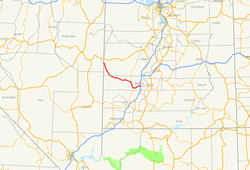Utah State Route 21

|
|
|---|---|
| map | |

|
|
| Basic data | |
| Overall length: | 107.6 mi / 173.1 km |
| Opening: | 1927 |
| Starting point: |
|
| End point: |
|
| Counties: |
Millard County Beaver County |
| Important cities: |
Garrison Milford Minersville Beaver |
The Utah State Route 21 is a highway in the southwest of the US state Utah ; it begins on Nevada State Route 487 about two kilometers northwest of Garrison and ends in Beaver near Interstate I-15.
course
The road begins east of the Great Basin National Park on the border with White Pine County , Nevada , as a continuation of Nevada State Route 487, which continues via Baker to US Highway 6 / US Highway 50 . After about two kilometers, the settlement of Garrison is reached, where the Utah State Route 159 coming from the north joins. The route runs through the Snake Valley past Pruess Lake and continues across the Mormon Gap into the Antelope Valley. After crossing the Halfway Hills at Halfway Summit (6300 ft./1920 m) the UNESCO Desert Experimental Range located in the Pine Valley is touched. The Wah Wah Mountains are crossed at the Wah Wah Summit (6439 ft./1963 m), the stretch, which now runs largely in an easterly direction, crosses the Wah Wah Valley and at the Frisco Summit (6500 ft./1981 m) the San Francisco Mountains before it reached the first major settlement in the Beaver Bottoms with Milford. The road turns south after converging on State Route 257 , crosses the Union Pacific stretch and follows the Beaver River valley through Milford Flat to Minersville, where it turns northeast after converging on State Route 130 . After passing the Minersville Reservoir, the route runs east, passes under Interstate 15 on the western outskirts of Beaver, and ends at State Route 160 in downtown.
history
The development of the desert-like southwest of the state of Utah took place in several stages in the course of the early 20th century. First, the section between Beaver and Milford was included in the system of State Highways from 1910. This route was extended to Frisco and Newhouse in 1916 in order to offer these mining towns a connection to the transport network. It was not until 1927 - the year in which the number 21, which is still valid today - was issued - that the section of route up to the Nevada border was completed.
